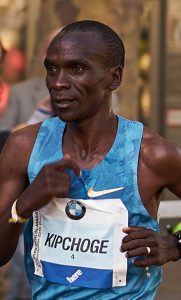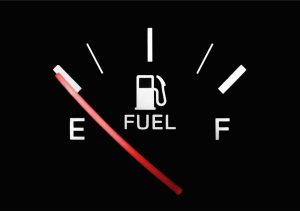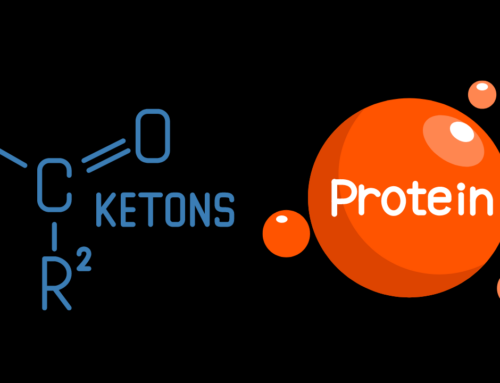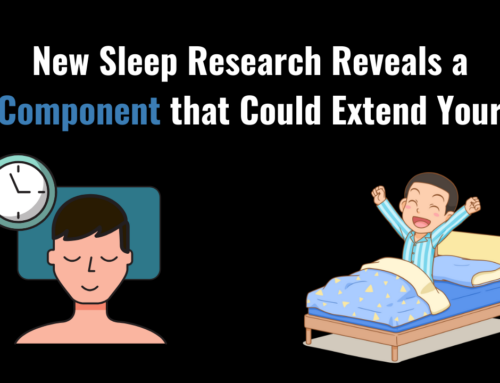On October 12, 2019 a massive world record did not just get beat but got crushed!
Eliud Kipchoge is now the first athlete to run a marathon in under two hours.

Eliud Kipchoge (photo: wiki)
He actually did it in 20 seconds under the 2-hour mark.
He ran in a time of 1:59:40 in the Ineos 1:59 Challenge in Vienna, Austria.
While you may not be an endurance athlete, this is a historical moment in the history of human performance.
Imagine running a single mile in 4 minutes and 33 seconds.
Supersonic fast.
Now do that 26 times and back to back.
While a monster performance like this is an n=1, it does leaves some clues.
How the Two-Hour Marathon Limit Was Broken | WIRED
One of them is in the area of fueling that record setting speed.
What did he drink and use during this world record setting race?
Maybe it was some super squirrel secret rocket fuel that is under 17 proprietary patents?

Running on Empty?
Was it a new space-age ketone ester that only he had access to?
Was he in a ketosis and that enabled his WR setting performance? Ketone Karl on the interwebZ told me that ketones are magical fuel collected from the farts of Patrick Arnold who defected to a top-secret lab in Uzbekistan.
All false.
You know what was the “secret” fuel?
Carbs.
Yep. Carbs.
No esoteric ketones were used (to my knowledge).
While the exact mixture is unknown at the time of this writing, based on his performance in a previous race in Berlin and the Nike Breaking 2, he used a mixture of a carbohydrate (GEL 100) and carbs in solution with electrolytes.
The GEL 100 according to their website is
“…. a biopolymer matrix, filled with a unique blend of fructose and glucose (ratio of 0.8:1) which enables uptakes of up to 100 grams of carbohydrates per hour.”
Yep, in the past he took in 100 gram per hour. The highest amount I’ve seen with positive results in research was 90 grams per hour (1).
But don’t just take my word for it, here is what super nerd and elite nutrition consultant Dr. Trent Stellingwerff said in an article from Running Magazine:
“The greater the carbohydrate oxidation during exercise (e.g. marathon running), the more efficient the energy production. The best way to maximize carbohydrate oxidation is to show up well fueled at the start line, as well as continue carbohydrate intake during the event – which is exactly what Kipchoge appeared to do. At his level, when compared to fueling with water alone, most might estimate a one to three percent improvement in performance with his fueling program.”
I see no mention of ketones or a ketogenic diet anywhere.
While ketones as a fuel and a supplement are super interesting, if you want flat out top end performance, there are very very little data to show they are the best (2-13).
We have lots of data to show that carbs are superior once again for elite performance where speed and power are critical (14-26). You can even go all they way back to 1887 (not a typo) and even earlier for more data (27).
Don’t even get me started about using fat as a fuel for high intensity performance.
It is a bioenergetic fact that fats can NOT compete with carbs for the RATE of energy production and long-term high fat diets turn down the rate of glycolysis via changes in PDH (28-32).
Massive hats off to Kipchoge and his team for an incredible performance.
And pass the carbZ.
Dr Mike
Nerd Fuel (aka References)
1. Impey SG, Hammond KM, Shepherd SO, Sharples AP, Stewart C, Limb M, et al. Fuel for the work required: a practical approach to amalgamating train-low paradigms for endurance athletes. Physiol Rep. 2016;4(10).
2. Stubbs BJ, Koutnik AP, Poff AM, Ford KM, D’Agostino DP. Commentary: Ketone Diester Ingestion Impairs Time-Trial Performance in Professional Cyclists. Front Physiol. 2018;9:279.
3. Scott BE, Laursen PB, James LJ, Boxer B, Chandler Z, Lam E, et al. The effect of 1,3-butanediol and carbohydrate supplementation on running performance. Journal of science and medicine in sport. 2019;22(6):702-6.
4. Fery F, Balasse EO. Effect of exercise on the disposal of infused ketone bodies in humans. The Journal of clinical endocrinology and metabolism. 1988;67(2):245-50.
5. Sansone M, Sansone A, Borrione P, Romanelli F, Di Luigi L, Sgro P. Effects of Ketone Bodies on Endurance Exercise. Current sports medicine reports. 2018;17(12):444-53.
6. Pinckaers PJ, Churchward-Venne TA, Bailey D, van Loon LJ. Ketone Bodies and Exercise Performance: The Next Magic Bullet or Merely Hype? Sports Med. 2017;47(3):383-91.
7. Balasse EO, Fery F. Ketone body production and disposal: effects of fasting, diabetes, and exercise. Diabetes/metabolism reviews. 1989;5(3):247-70.
8. Leckey JJ, Ross ML, Quod M, Hawley JA, Burke LM. Ketone Diester Ingestion Impairs Time-Trial Performance in Professional Cyclists. Front Physiol. 2017;8:806.
9. Holdsworth DA, Cox PJ, Kirk T, Stradling H, Impey SG, Clarke K. A Ketone Ester Drink Increases Postexercise Muscle Glycogen Synthesis in Humans. Medicine and science in sports and exercise. 2017;49(9):1789-95.
10. Scott JM, Deuster PA. Ketones and Human Performance. Journal of special operations medicine : a peer reviewed journal for SOF medical professionals.17(2):112-6.
11. Wroble KA, Trott MN, Schweitzer GG, Rahman RS, Kelly PV, Weiss EP. Low-carbohydrate, ketogenic diet impairs anaerobic exercise performance in exercise-trained women and men: a randomized-sequence crossover trial. The Journal of sports medicine and physical fitness. 2019;59(4):600-7.
12. Evans M, Cogan KE, Egan B. Metabolism of ketone bodies during exercise and training: physiological basis for exogenous supplementation. The Journal of physiology. 2017;595(9):2857-71.
13. Cox PJ, Kirk T, Ashmore T, Willerton K, Evans R, Smith A, et al. Nutritional Ketosis Alters Fuel Preference and Thereby Endurance Performance in Athletes. Cell Metab. 2016;24(2):256-68.
14. Brooks GA, Mercier J. Balance of carbohydrate and lipid utilization during exercise: the “crossover” concept. J Appl Physiol (1985). 1994;76(6):2253-61.
15. Hawley JA, Leckey JJ. Carbohydrate Dependence During Prolonged, Intense Endurance Exercise. Sports Med. 2015;45 Suppl 1:S5-12.
16. King AJ, O’Hara JP, Morrison DJ, Preston T, King R. Carbohydrate dose influences liver and muscle glycogen oxidation and performance during prolonged exercise. Physiol Rep. 2018;6(1).
17. Williams C, Rollo I. Carbohydrate Nutrition and Team Sport Performance. Sports Med. 2015;45 Suppl 1:S13-22.
18. Bergstrom J, Hermansen L, Hultman E, Saltin B. Diet, muscle glycogen and physical performance. Acta physiologica Scandinavica. 1967;71(2):140-50.
19. Sherman WM, Costill DL, Fink WJ, Miller JM. Effect of exercise-diet manipulation on muscle glycogen and its subsequent utilization during performance. Int J Sports Med. 1981;2(2):114-8.
20. Burke LM, Cox GR, Culmmings NK, Desbrow B. Guidelines for daily carbohydrate intake: do athletes achieve them? Sports Med. 2001;31(4):267-99.
21. Kerksick CM, Wilborn CD, Roberts MD, Smith-Ryan A, Kleiner SM, Jager R, et al. ISSN exercise & sports nutrition review update: research & recommendations. J Int Soc Sports Nutr. 2018;15(1):38.
22. Hermansen L, Hultman E, Saltin B. Muscle glycogen during prolonged severe exercise. Acta physiologica Scandinavica. 1967;71(2):129-39.
23. Dimaur S, Andreu AL, Bruno C, Hadjigeorgiou GM. Myophosphorylase deficiency (glycogenosis type V; McArdle disease). Current molecular medicine. 2002;2(2):189-96.
24. Beelen M, Cermak NM, van Loon LJ. [Performance enhancement by carbohydrate intake during sport: effects of carbohydrates during and after high-intensity exercise]. Nederlands tijdschrift voor geneeskunde. 2015;159:A7465.
25. Pochmuller M, Schwingshackl L, Colombani PC, Hoffmann G. A systematic review and meta-analysis of carbohydrate benefits associated with randomized controlled competition-based performance trials. J Int Soc Sports Nutr. 2016;13:27.
26. Stellingwerff T, Cox GR. Systematic review: Carbohydrate supplementation on exercise performance or capacity of varying durations. Applied physiology, nutrition, and metabolism = Physiologie appliquee, nutrition et metabolisme. 2014;39(9):998-1011.
27. M. S. Athletics and football. London: Longman’s, Green, and Co; 1887.
28. Stellingwerff T, Spriet LL, Watt MJ, Kimber NE, Hargreaves M, Hawley JA, et al. Decreased PDH activation and glycogenolysis during exercise following fat adaptation with carbohydrate restoration. Am J Physiol Endocrinol Metab. 2006;290(2):E380-8.
29. Carey AL, Staudacher HM, Cummings NK, Stepto NK, Nikolopoulos V, Burke LM, et al. Effects of fat adaptation and carbohydrate restoration on prolonged endurance exercise. J Appl Physiol (1985). 2001;91(1):115-22.
30. Schonke M, Massart J, Zierath JR. Effects of high-fat diet and AMP-activated protein kinase modulation on the regulation of whole-body lipid metabolism. Journal of lipid research. 2018;59(7):1276-82.
31. Sparks LM, Xie H, Koza RA, Mynatt R, Hulver MW, Bray GA, et al. A high-fat diet coordinately downregulates genes required for mitochondrial oxidative phosphorylation in skeletal muscle. Diabetes. 2005;54(7):1926-33.
32. Parolin ML, Chesley A, Matsos MP, Spriet LL, Jones NL, Heigenhauser GJ. Regulation of skeletal muscle glycogen phosphorylase and PDH during maximal intermittent exercise. The American journal of physiology. 1999;277(5):E890-900.




Leave A Comment